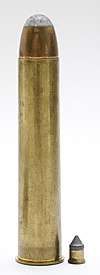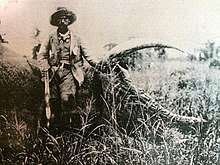.577 Nitro Express
The .577 Nitro Express is a large bore centerfire rifle cartridge designed for the purpose of hunting large game such as elephant. This cartridge is used almost exclusively in single shot and double express rifles for hunting in the Tropics or hot climates in general and is a cartridge associated with the Golden Age of African safaris and Indian shikars.
| .577 Nitro Express 3-inch | ||||||||
|---|---|---|---|---|---|---|---|---|
 The .577 Nitro Express is a large small-arms cartridge. In this picture, it is compared to one of the smallest cartridges, a .22 CB. | ||||||||
| Type | Rifle | |||||||
| Place of origin | United Kingdom | |||||||
| Service history | ||||||||
| In service | 1915-1916 | |||||||
| Used by | British Army | |||||||
| Wars | World War 1 | |||||||
| Production history | ||||||||
| Designed | 1890s | |||||||
| Specifications | ||||||||
| Parent case | .577 Black Powder Express | |||||||
| Bullet diameter | .585 in (14.9 mm) | |||||||
| Neck diameter | .610 in (15.5 mm) | |||||||
| Base diameter | .660 in (16.8 mm) | |||||||
| Rim diameter | .748 in (19.0 mm) | |||||||
| Rim thickness | .052 in (1.3 mm) | |||||||
| Case length | 3.00 in (76 mm) | |||||||
| Overall length | 3.70 in (94 mm) | |||||||
| Case capacity | 185.3 gr H2O (12.01 cm3) | |||||||
| Primer type | .254 | |||||||
| Ballistic performance | ||||||||
| ||||||||
| Test barrel length: 28 Source(s): Barnes[1] and Kynoch.[2] | ||||||||
| .577 Nitro Express 2¾-inch | ||||||||
|---|---|---|---|---|---|---|---|---|
| Ballistic performance | ||||||||
| ||||||||
| Test barrel length: 28 Source(s): Kynoch.[2] | ||||||||
Design
The .577 Nitro Express is a straight rimmed .584-inch (14.8 mm) calibre cartridge designed for use in single-shot and double rifles. It has been made in three case lengths based on their respective black-powder .577 Black Powder Express cartridges.
.577 Nitro Express 2¾-inch
The .577 Nitro Express 2¾-inch is a conversion of the .577 Black Powder Express 2¾-inch, it fires a 750-grain (49 g) projectile at over 1,800 feet per second (550 m/s). Never as popular as the 3-inch version, today it is only available by special order.[2]
.577 Nitro Express 3-inch
The .577 Nitro Express 3-inch is a conversion of the .577 Black Powder Express 3-inch, it fires a 750-grain (49 g) projectile at over 2,050 feet per second (620 m/s). This cartridge was to become the most popular of the three and a standard round for African elephant hunters in the early 20th century.[3]
.577 Nitro Express 3¼-inch
The .577 Nitro Express 3¼-inch is a conversion of the .577 Black Powder Express 3¼-inch, again it was never as popular as the 3-inch version.
History
Following the success of the development in 1898 of the revolutionary .450 Nitro Express by John Rigby & Company, achieved by loading the old .450 Black Powder Express with cordite, similar conversions were made to other blackpowder Express cartridges, including the .577 Black Powder Express in its various case lengths.[3]
Once a standard rifle calibre, the rise of Mauser's Gewehr 98 bolt actioned rifles offered cheaper alternatives to the expensive double rifles required by the Nitro Express cartridges. Several manufacturers still make rifles chambered in .577 Nitro Express, including Butch Searcy & Co., Hambrusch Hunting Weapons, Hartmann & Weiss, Heym, Holland & Holland, James Purdey and Sons and Westley Richards.
WWI service
In 1914 and early 1915, German snipers were engaging British Army positions with impunity from behind steel plates that were impervious to .303 British ball ammunition. In an attempt to counter this threat, the British War Office purchased fifty-two large bore sporting rifles from British rifle makers which were issued to regiments, including two .577 Nitro Express rifles. These large bore rifles proved very effective against the steel plates used by the Germans, in his book Sniping in France 1914-18 MAJ H. Hesketh-Prichard, DSO, MC stated they "pierced them like butter."[4][5][6]
Use
The .577 Nitro Express is suitable for hunting all dangerous game, although it was considered something of a specialist elephant hunter's tool for close cover hunting and emergencies, the harsh recoil this round produces requires a rifle of 13-pound (5.9 kg) minimum weight. Typically a hunter carried a lighter rifle in a smaller calibre for general hunting whilst a rifle bearer carried a heavy gun such as this, a necessity as an exhausted man could not reliably aim such heavy rifles as these.[1][7]
In his African Rifles and Cartridges, John "Pondoro" Taylor says the .577 Nitro Express is "a magnificent killer - it literally crumbles up an elephant", further stating the shock of a head shot from a .577 Nitro Express bullet is enough to knock an elephant out for up to 20 minutes.[7]
Prominent users
James H. Sutherland, who over the course of his life shot between 1,300 and 1,600 elephants, stated in his The Adventures of an Elephant Hunter, "after experimenting with and using all kinds of rifles, I find the most effective to be the double .577 with a 750 grains bullet and a charge in Axite powder equivalent to a hundred grains of cordite." And further stating "I think the superiority of the .577 over the .450 and .500 rifles, will be evident when I state that I have lost elephants with these last two rifles, while I have bagged others with identically the same shots from a .577.”[7][8][9]

Other famous African users include Major G.H. Anderson (shot between 350 and 400 elephants), Deaf Banks (shot over 1,000 elephants), Quentin Grogan, John A. Hunter (shot more than 1,000 rhinoceros) and Pete Pearson (shot over 2,000 elephants).[7][8]
"Pondoro" Taylor used a Westley Richards .577 Nitro Express double rifle, stating "it did great work for me amongst elephant, rhino and buffalo; it's much too powerful for anything lighter." He parted with the rifle after only a short period because the single-trigger mechanism was unlike all of his other rifles.[7]
Ernest Hemingway and Alfred Józef Potocki both owned Westley Richards Droplock .577 Nitro Express double rifles, Stewart Granger owned two including Potocki's rifle.[10]
Parent case
- .585 Nyati - developed by turning out the rim and blowing out straight walls of the .577 Nitro Express to allow formation of enough of a shoulder for headspace purposes, making it a "rimless" version.[1]
- .600/570 JDJ - developed by straightening the taper of the .577 Nitro Express to accept .620-inch (15.7 mm) diameter bullets from the .600 Nitro Express.[1]
See also
References
- Frank C. Barnes, Cartridges of the World, ed 13, Gun Digest Books, Iola, 2012, ISBN 9781440230592.
- Kynoch Ammunition, "Big Game Cartridges", www.kynochammunition.co.uk, archived 18 January 2017.
- Terry Wieland, "Nitro Express: The Big Bang of the Big Bang", ezine.nitroexpress.info/NickuduFiles, retrieved 3 December 2016.
- MAJ H. Hesketh-Prichard, DSO, MC, Sniping in France 1914-18: With Notes on the Scientific Training of Scouts, Observers and Snipers, Helion & Company, Solihull, 2013, ISBN 1-874622-47-7.
- Imperial War Museums, ".577 3 inch Nitro Express & Eley", iwm.org.uk, retrieved 14 September 2017.
- Douglas Tate, "Sporting guns that went to war", The Field Magazine, Vol 324 No 7321, August 2014, pp 100–103.
- John Taylor, African rifles and cartridges, Sportsman’s Vintage Press, 2013, ISBN 978-1-940001-01-2.
- Simon Clode, "Famous hunters and their Westley Richards rifles", theexplora.com, retrieved 3 December 2016.
- James H. Sutherland, The Adventures Of An Elephant Hunter, Macmillan, London, 1912.
- Simon Clode, "Stewart Granger and his .577s", theexplora.com, retrieved 3 December 2016.
External links
- Ammo-One, ".577" Nitro Express", ammo-one.com, retrieved 14 September 2017.
- Cartridgecollector, "577 2¾" Nitro Express", cartridgecollector.net, retrieved 14 September 2017.
- Cartridgecollector, "577 3" Nitro Express", cartridgecollector.net, retrieved 14 September 2017.
- Cartridgecollector, "577 3¼" Nitro Express", cartridgecollector.net, retrieved 14 September 2017.